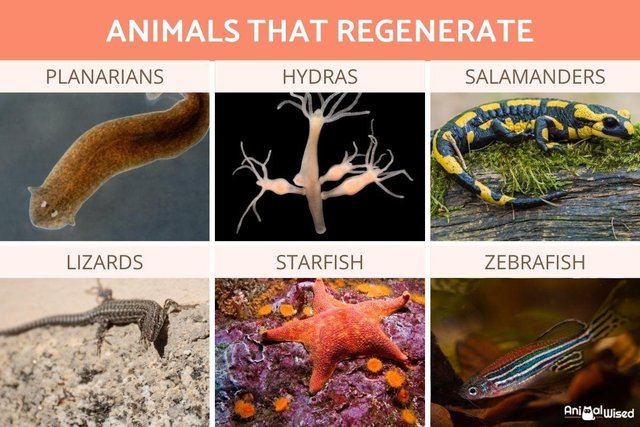Identified an essential mechanism to regenerate organs/Identificado un mecanismo esencial para regenerar órganos

Source
We have all had the opportunity when we were children to see how lizards shed their tail to escape and how it ends up regenerating over time, the same thing happens with other animals such as salamanders or starfish that can also regenerate the amputated parts of his body.
Todos hemos tenido alguna vez cuando éramos niños la oportunidad de ver como las lagartijas se desprenden de su cola para poder escapar y como esta se acaba regenerando con el tiempo, esto mismo ocurre con otros animales como las salamandras o las estrellas de mar que también pueden regenerar las partes amputadas de su cuerpo.
Obviously, if we were able to understand this regeneration process and apply it to the human body, it would be an unprecedented advance in medicine, since this is what, in principle, a team of Spanish scientists from the National Center for Cardiovascular Research (CNIC) are trying to discover.
Obviamente si fuésemos capaces de entender este proceso de regeneración y aplicarlo al cuerpo humano sería un avance sin precedentes en la medicina, pues esto es lo que en principio un equipo de científicos españoles del Centro Nacional de Investigaciones Cardiovasculares (CNIC) están tratando de descubrir.

Source
According to these scientists, the processes of growth and regeneration of organs require the activation of the genes necessary for these processes to be triggered, this depends on the entry into the cell nucleus of the proteins responsible for activating these processes and it seems that they have managed to discover the mechanism that introduces these proteins into the interior of the nucleus.
Según estos científicos, los procesos de crecimiento y regeneración de los órganos requieren que se activen los genes necesarios para que se desencadenen dichos procesos, esto depende de la entrada al núcleo celular de las proteínas encargadas de activar estos procesos y parece que han logrado descubrir el mecanismo que introduce esas proteínas en el interior del núcleo.
One of the most important proteins is called "YAP", this protein, faced with an increase in the mechanical force to which the tissue is subjected, is capable of activating this process and entering the nucleus of the cell, where it activates several genes that trigger the growth of the organ to which that cell belongs.
Una de las proteínas más importantes es la llamada "YAP”, esta proteína ante un incremento en la fuerza mecánica a la que está sometido el tejido, es capaz de activar este proceso y entrar al núcleo de la célula, donde activa varios genes que desencadenan el crecimiento del órgano al que pertenece esa célula.

Source
Although this protein was already known by scientists for its involvement in the regeneration of organs, or in diseases such as atherosclerosis and cancer, it was still unknown how it entered the nucleus of the cell, until now that these scientists have discovered the mechanism used by YAP which they have called Importina-7.
Aunque esa proteína ya era conocida por los científicos por su implicación en la regeneración de órganos, o en enfermedades como la aterosclerosis y el cáncer, aún se desconocían cómo se producía la entrada al núcleo de la célula, hasta ahora que estos científicos han descubierto el mecanismo utilizado por YAP al que han llamado Importina-7.
This Importina-7 is the one that YAP uses to enter the nucleus of the cell and thus induce cell growth and tissue regeneration, in the same way they have also identified a new target for the development of drugs aimed at blocking this shuttle that already have been successfully tested on fly organs.
Esta Importina-7 es la que YAP utiliza para entrar en el núcleo de la célula y así inducir el crecimiento celular y la regeneración del tejido, del mismo modo también han identificado una nueva diana para el desarrollo de medicamentos orientados a bloquear esa lanzadera que ya se han probado con éxito en órganos de mosca.
More information/Más información
https://www.genengnews.com/topics/omics/shuttle-protein-identified-as-essential-for-organ-growth-and-development/
Hola @mauromar, eso sería algo muy bueno para muchas personas que lo necesitan, sobre todo niños.

Saludos @mauromar esto no deja de ser impresionante por poco que sea el avance, pero supongo que regenerar músculos y huesos humanos no será sencillo y mucho menos rápido.
After YAP protein enters the nucleus Human body can regenerate damage body parts?
Not so easy, YAP stimulate cells to divide but I guess there are still a lot work to do to make a new organ.
I think that if one day this is applied to the human being, we would be crossing the barrier of morality, since the human being would no longer be a human being as such. It would be something like, human-animal hybrid. Suppose they carry out this experiment and it goes well, but other scientists come up with the idea of altering the genetics of the eyes and their shape so that they can see better, they also alter the shape of their ears and they modify their feet so that they can run better . The question we ask is: Who dictates how far the human body is experienced and modified?